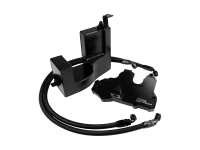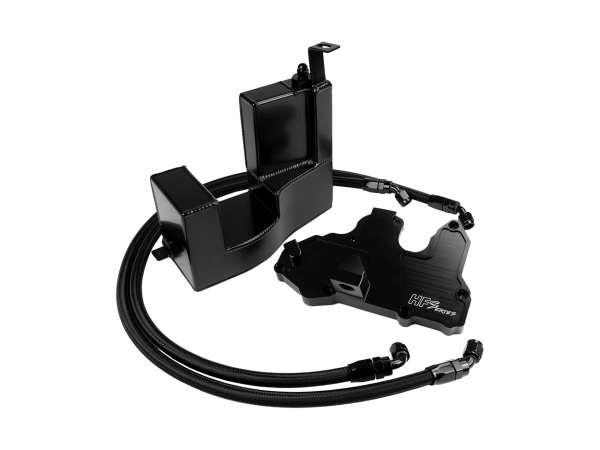* Prices incl. VAT plus shipping costs
Estimated delivery time: approx. 2-7 workdays
- Article number: HGCCVAG03

No corking of the intake valves and intake manifold flaps and all that without Bedi cleaning? And no loss of performance? Our TFSI Catch Can Set is the solution.
Advantages:
- Oil steam is led into the catch tank and collected there
- No corking of the intake manifold flaps and intake valves
- Clean combustion, as less oil is burned
- No loss of performance
- Cleaner combustion
- Fits with original intake/engine cover
- Fits at all FWD & AWD cars
- the hoses are already prefabricated in the correct length and the connections are pre-assembled
- the OEM sealing can be taken over/ does not have to be modified
Disadvantage without Catch Tank:
- valve corking -> valve rupture -> this in turn can cause engine damage
- loss of performance -> rough running at idle
Technical details:
- Catch tank with chamber construction incl. sinter filter
- Volume: about 1200 ml
- Black steel flex pipes with racing fittings
- CNC milled PCV Fix
- Black anodized
- Plug&Play set without adjustment work
- Emptying the catch tank (e.g. for an oil change) from below is possible without having to remove the tank
- without approval
Regularly, the oil and water steams are directed into the intake manifold, where they are ignited and ejected after entering the combustion chamber in combination with the fuel-air mixture.
The direct injection system of the TSI models means that the cylinder heads and valves are no longer flushed with fuel.
This means that the fuel normally used for cleaning is missing because it is injected directly into the combustion chamber.
As a result, massive dirt builds up through the exhaust gas recirculation in conjunction with the oil and water steams from the crankcase ventilation.
These are deposited on the chambers of the cylinder heads and on the valves.
Due to these depositions (corking), the material surface becomes rough, the air guide cross-sections narrow and neither optimal air turbulence nor optimal cylinder filling is achieved, nor optimal cylinder filling.
If the corking is still slight, the performance will initially be noticeably reduced and a rough idle will occur.
This is accompanied by worse exhaust gas values and higher consumption.
In the advanced stage, even the valve train is disturbed by these corkings in such a way that the valves partially no longer close and as a result there is no compression on the affected cylinders, which leads to misfiring.
The corking can also cause the valves to break off.
In the worst case, this can cause engine damage.
The Catch Can Set from HF-Series solves this problem once and for all.
A Catch Tank System does not lead the oil steams produced during engine operation to the intake tract.
The oil steam is led into the Catch Tank and collected there. As a result, valve corking is reduced.
This reduction leads to better engine running and ultimately to the best possible restoration of the original performance.
In addition, the installation of the system makes combustion cleaner.
Despite the diversion of oil and water steam into the catch can, the emission values (Euronorm) are still kept.
The main problem: the poorly designed crankcase ventilation.
At high G-forces, especially in combination with higher oil temperatures, the oil sloshes up to the crankcase ventilation and then goes directly into the fresh gas side of the turbocharger, resulting in a lot of noise from the tailpipes.
The consequences: Emergency run program, misfiring, up to supercharger damage and even capital engine damage.
Under sporty conditions, the oil separator does not function optimally.
Sporty conditions usually occur on the race track, but can also be possible due to heavy braking from high speeds or on steep roads.
The solution: This is exactly where our catch-can system differs from simple variants where a tank is simply placed between the recirculation.
In our case, the complete PCV block on the cylinder head is also converted. This is designed to prevent "spillage" of the engine oil into the recirculation system and this problem is a thing of the past with all EA888 Gen3/4 engines.
HF-Series
HF-Series is the first point of contact when it comes to fresh air supply in vehicles. With this brand, HG-Motorsport has combined professional research and production of high quality intake systems, intercoolers and air guidance systems. In addition to 3D scanning of the vehicle periphery for perfect fitting accuracy, this also includes long series of tests to combine the optimum components for each individual model. The result is racing products.
Herstellerangaben gemäß Produktsicherheitsverordnung:
HF-Series ist eine Marke der HG-Motorsport GmbH
Hersteller:
HG-Motorsport GmbH
Steinbrückerstr. 6
23556 Lübeck
Telefon: 04514094600
E-Mail: info@hg-motorsport.de
Capacity: 1984cm³
Manuf. Type Engine Power Engine code
Cupra Ateca (KHP) 2.0 TSI 4Drive 221 kW (300HP) DNUE, DNFC
Seat Leon III (5F) 2.0 TSI 140 kW (190HP) DKZA
Seat Leon III (5F) Cupra 265 2.0 TSI 195 kW (265HP) CJXE
Seat Leon III (5F) Cupra 280 2.0 TSI 206 kW (280HP) CJXA
Seat Leon III (5F) Cupra 290 2.0 TSI 213 kW (290HP) CJXH, DNUC
Seat Leon III (5F) Cupra 300 2.0 TSI 221 kW (300HP) CJXC
Seat Leon III (5F) CupraR 310 2.0 TSI 228 kW (310HP) CJXG
VW Golf VII VFL GTI 2.0 162 kW (220HP) CHHB
VW Golf VII VFL GTI Performance 2.0 TSI 169 kW (230HP) CHHA
VW Golf VII VFL GTI Clubsport 2.0 TSI 195 kW (265HP) CJXE
VW Golf VII VFL R 2.0 221 kW (300HP) CJXC
VW Golf VII VFL R 2.0 228 kW (310HP) CJXG
VW Golf VII VFL R360S 2.0 TSI 265 kW (360HP) CJXC
VW Golf VII FL GTI 2.0 TSI 169 kW (230HP) CHHA
VW Golf VII FL GTI Performance 2.0 TSI 180 kW (245HP) DLBA
VW Golf VII FL TCR 2.0 TSI 213 kW (290HP) CJXH, DNUC
VW Golf VII FL R 2.0 TSI 228 kW (310HP) DJHA















